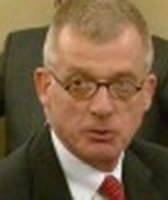Stand up for the facts!
Our only agenda is to publish the truth so you can be an informed participant in democracy.
We need your help.
I would like to contribute
PolitiFact awards the Lie of the Year to the most significant falsehood or exaggeration that worked to undermine an accurate narrative. The 2020 designation goes to downplay and denial about the coronavirus.
Here’s a look back at the past 11 years of "winners."
2019: Donald Trump’s claim that whistleblower got Ukraine call 'almost completely wrong'
President Donald Trump worked hard to discredit a whistleblower complaint about a July 2019 phone call he had with Ukrainian President Volodymyr Zelensky. The whistleblower raised the concern that Trump’s actions leading up to and on that phone call amount to interference in the 2020 presidential election. Trump smeared the whistleblower as "partisan" and insisted more than 80 times that the whistleblower’s account was incorrect, "total fiction" and "almost completely wrong."
Despite Trump’s claims, the whistleblower got the call "almost completely" right. The whistleblower’s account was validated by the very record of the call as released by the White House, plus testimony under oath from career diplomats and other officials. Also, Trump and his allies told reporters that Trump urged Zelensky to investigate political rival Joe Biden — that’s the point raised in the whistleblower’s complaint.
2018: Online smear machine tries to take down Parkland students
After 17 people were viciously gunned down at a Florida high school, lies about the students started when they advocated for action against gun violence. Students were called "crisis actors" and worse. During a time of little bipartisanship, the attacks on the Parkland students set off a shared outrage in nearly all political corners.
2017: Russian election interference is a 'made-up story'
Trump continually asserted that Russia’s meddling in the 2016 election was fake news, a hoax or a made-up story, even though there is widespread, bipartisan evidence to the contrary. In both classified and public reports, U.S. intelligence agencies said Russian President Vladimir Putin ordered actions to interfere with the election.
2016: Fake news
Conspiracy theories and hoaxes have always been part of America’s political conversation, but in 2016 they took off online. Fake news found a willing enabler in then- candidate Trump, who at times repeated and legitimized made-up reports. We defined fake news as fabricated information, manipulated to look like credible news reports, then easily spread online.
2015: The campaign misstatements of Donald Trump
From "thousands and thousands" cheering in New Jersey on Sept. 11 to dubious accounts of his own record and words, Trump’s 2015 inaccurate statements exhibited range, boldness and a disregard for the truth. By December 2015, we had rated 76% of Trump’s claims Mostly False, False or Pants on Fire. No other politician had clocked more falsehoods on our Truth-O-Meter, and our only real contenders for Lie of the Year were Trump’s. We rolled all them into one big trophy in 2015.
2014: Exaggerations about Ebola
In 2014, there were just two Ebola-related deaths in the United States, yet fear of the disease stretched nationwide, stoked by exaggerated claims from politicians and pundits. They said, wrongly, that Ebola was easy to catch, that immigrants illegally in the country may be carrying the virus, and that it was all part of a government or corporate conspiracy.
The false claims distorted the debate about a serious public health issue and edged the nation toward panic. In all, PolitiFact and PunditFact rated 16 separate Ebola claims as Mostly False, False or Pants on Fire, so we chose this collection as our 2014 Lie of the Year.
2013: 'If you like your health care plan, you can keep it'
President Barack Obama and other Democrats made this claim when marketing the Affordable Care Act. But in the fall of 2013, people started to receive insurance cancellation notices, definitively proving the statement wrong.
Boiling down the complicated health care law to a soundbite proved treacherous. Obama and his team made matters worse, suggesting the claim had been misunderstood all along. The political uproar led to a rare presidential apology.
2012: Mitt Romney campaign's ad on Jeeps made in China
During the 2012 presidential campaign, Mitt Romney’s campaign unleashed an ad suggesting that Jeep was pulling its plants out of Ohio, a critical swing state, and moving production to China. But the Ohio Jeep plants weren’t going anywhere; the moves in China were to expand into the Chinese auto market.
A flood of negative press coverage rained down on the Romney campaign, and he failed to turn the tide in Ohio, a key battleground state.
2011: ‘Republicans voted to end Medicare’
After two years of being pounded by Republicans with false charges about the 2010 health care law, Democrats turned the tables. They slammed Republicans in the U.S. House of Representatives for voting for a cost-cutting budget resolution promoted by Rep. Paul Ryan, R-Wis.
Democrats said voting for this resolution amounted to voting to end Medicare. But Ryan never proposed ending Medicare; instead he wanted to bring more private insurers into the program. Democrats later modified their talking point to say Republicans wanted to end Medicare "as we know it."
2010: 'A government takeover of health care'
As lawmakers finalized the Affordable Care Act, Republicans couldn’t stop repeating their mantra that the law is a government takeover of health care. It’s not.
"Government takeover" connotes a European approach where the government owns the hospitals and the doctors are public employees. But the Affordable Care Act relies largely on the free market, and it does not nationalize the country’s health system in any way.
2009: 'Death panels'
Sarah Palin was the first to say the Affordable Care Act included "death panels" — PolitiFact’s very first Lie of the Year. Government boards that would determine whether seniors and the disabled were worthy of care were wholly fictional. Yet about 30% of the public in 2009 believed they were part of the health care law.
This wasn’t hard to fact-check. There were not — and still aren’t — any such death panels in the law.
Our Sources
PolitiFact





































